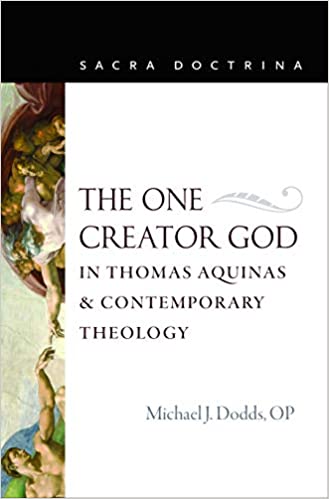A Review of The One Creator God in Thomas Aquinas and Contemporary Theology, by Michael J. Dodds (Washington, DC: Catholic University of America Press, 2020)

The classical doctrine of God has received lavish attention from Christian scholars in the past few years, particularly among Protestants. Much of this renewed focus has been concerned with expositing the attributes of God. [1]
The One Creator God in Thomas Aquinas and Contemporary Theology, written by Michael J. Dodds, differs from recent work in a couple of key respects. Its scope is both broader and narrower—the former because it addresses more than the attributes of God, and the latter because it focuses exclusively on Thomas Aquinas. The result is an introductory yet robust discussion of the divine nature as a whole, including God’s knowledge, life, will, and love, among other topics.
For each topic, Dodds expounds the thought of Aquinas—extensively citing his Summa Theologiae and other works, such as the Summa contra Gentiles—as well as Thomists who have followed his steps. Dodds also defends the Thomistic perspective on the doctrine of God in the face of modern objections.
Dodds does a wonderful job of addressing everyday questions Christians have about God: if God knows all things and governs everything by his divine providence, how can humans have free will? Does God change his mind about what he wills, as so often appears to be the case in Scripture? If God is impassible, as classical theism maintains, what does it mean to say God loves us and has compassion for us? Questions like these almost inevitably arise when the traditional Christian doctrine of God is taught, but Dodds ably demonstrates that the God of classical theism, far from being deficient and incapable of truly loving us, is alone able to really and perfectly be God for us.
A crucial prerequisite for understanding this is the simple recognition that we cannot speak of God and humans in univocal terms, “implicitly [viewing] God as a being like any other” (155). Rather, we must recognize that God’s transcendence requires us to speak of him analogously, meaning the language we use about him is “in some ways the same and in some ways different” from how we speak of humans (87). Understanding the relevant philosophical concepts—matter, form, act, potency, and so on—is also important, so it is worth noting that Dodds helpfully explains these concepts in the first appendix.
By contrast, the second appendix, titled “The Emergence of Monotheism,” feels somewhat out of place, as it detours into the realm of biblical scholarship and does not even mention Aquinas. Here Dodds explores “how monotheism arose historically in Israel” (188), beginning with Abraham and tracing Israel’s development from monolatry, defined as “worship of one god which does not deny the existence of others,” to monotheism, “belief in one god which denies the existence of others” (189). He concludes:
It has been argued [in this appendix] that the development of Israel’s monolatry and the transition to monotheism involved “both an ‘evolution’ and a ‘revolution’ in religious conceptualization.” As evolution, Israel’s religion grew out of its roots in Canaanite culture and its assimilation of features of Canaanite deities to Yahweh. As revolution, the Israelites understood their religion as founded on God’s action in their history, liberating them from slavery in Egypt and establishing a covenantal relationship with them, embodied in the Law that was given at Mount Sinai. The experience of God in that covenant relationship allowed them gradually to understand Yahweh not only as the God who alone should be worshiped but as God who alone exists. (197–98)
Granting that Dodds’ aim in providing this genealogy is somewhat opaque, he seems to be saying Israelite monotheism can be traced only as far back as the Exodus—and even then it was only “implicitly present” (198). That God first revealed himself as one to Adam and Eve is commonly affirmed by traditional Christianity[2], so it is puzzling that Dodds’ history of Israelite monotheism does not mention Adam and Eve or any part of the biblical account prior to Abraham—even once.
Indeed, the account Dodds articulates appears to uphold an evolutionary approach to religion, in which it is assumed that “religions [have] a purely human origin, moving from a very simplistic religion to more sophisticated beliefs.”[3] In contrast, the position known as original monotheism “locates the beginnings of religion in God…. People responded to God’s self-disclosure, and religion came into existence.”[4] This position is as old as monotheistic faith itself, but it was first laid out in a systematic and scholarly manner by a Roman Catholic priest and ethnologist named Wilhelm Schmidt.[5]
Lest I overstate the significance of this appendix, potential readers should understand that it comprises only about five percent of the book. I have dwelled on it because I thought these concerns were at least worth mentioning.
Nonetheless, The One Creator God is overall an excellent exposition of the classical doctrine of God as understood by Aquinas. It is substantive without becoming too onerous for those without prior exposure to the ideas presented therein. Most importantly, it offers an older, better alternative to the stultified theism of modernity. Rightly understood, God’s utter transcendence is awesome to contemplate, but it is precisely this transcendence that enables him to be more intimately present with us and in us than we often realize.
James Clark is a student at Yale Divinity School. His writing has appeared in Themelios, Front Porch Republic, and The North American Anglican, as well as other publications. Find his work at https://jamesdkclark.wordpress.com/.
[1] Examples include Steven J. Duby, Divine Simplicity: A Dogmatic Account (New York: T&T Clark, 2016, repr. 2018); Joseph Minich and Onsi A. Kamel, eds., The Lord is One: Reclaiming Divine Simplicity (Davenant Press, 2019); James E. Dolezal, All That Is in God: Evangelical Theology and the Challenge of Classical Christian Theism (Grand Rapids: Reformation Heritage, 2017); and Matthew Barrett, None Greater: The Undomesticated Attributes of God (Grand Rapids: Baker, 2019).
